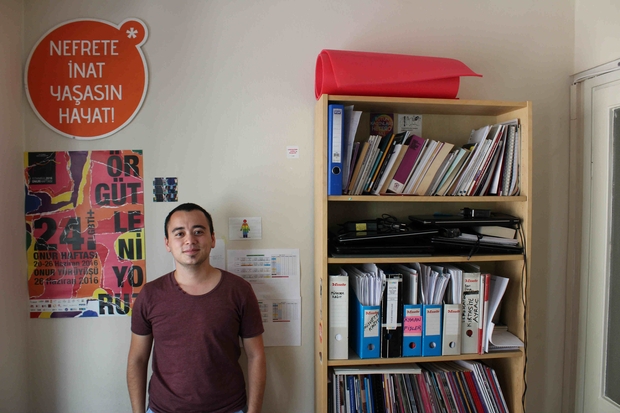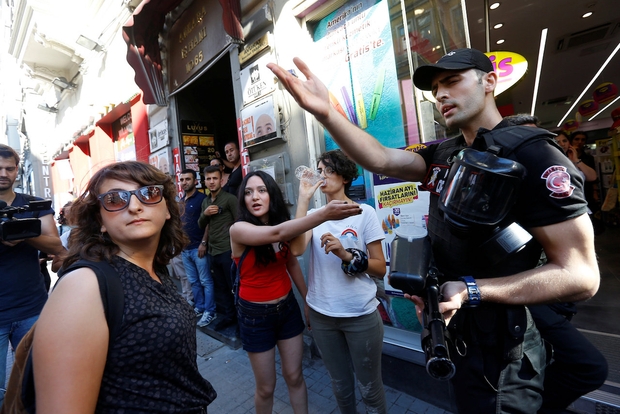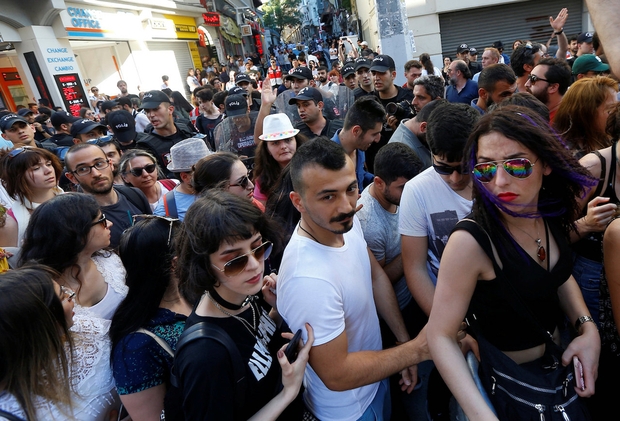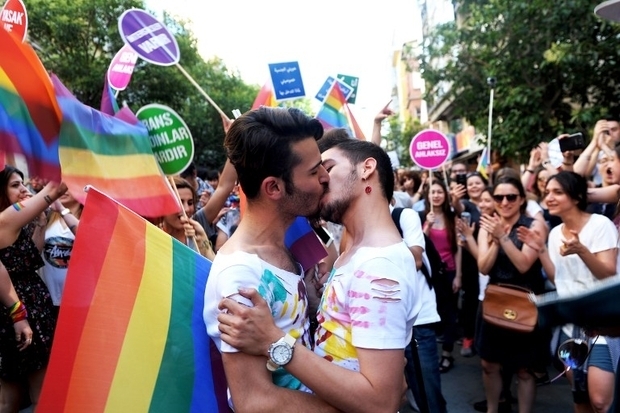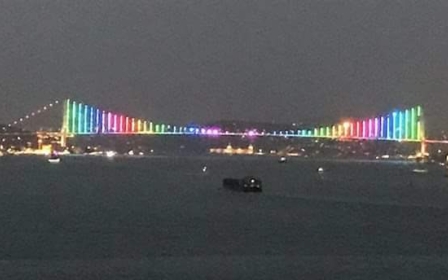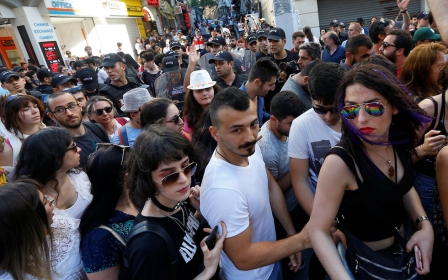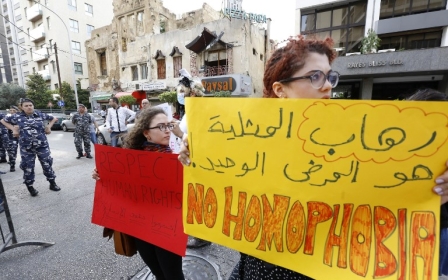Facing own dangers, Turkey’s LGBT community defends Syrian counterparts
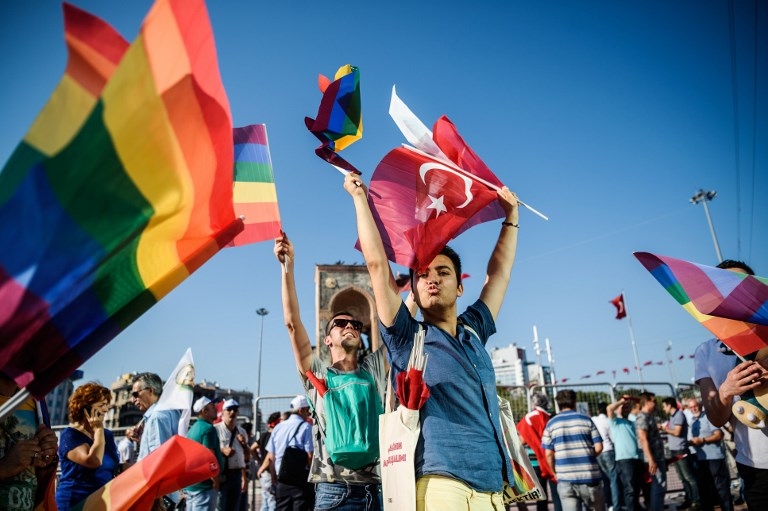
ISTANBUL, Turkey - On a warm afternoon in June, Istanbul’s Syrian LGBT community gathers together in the boisterous district of Sisli. Ayman Menem, a well-groomed refugee and activist from Damascus, is hosting the event.
Every Sunday, Syrian LGBT refugees from all corners of the city meet up for weekly “Tea and Talk” meetings. Several issues are discussed, including the difficulties involved with obtaining residency permits and applying for asylum, as well as more mundane matters such as entry prices into Istanbul’s various gay clubs.
“We come to talk about finding a job and leaving for Europe. But also about the problems we have with our boyfriends,” says Ammar, 19, a tall and soft-spoken refugee from the Syrian capital.
Syrian LGBT refugees in Turkey form a tight-knit group. As members of the minority LGBT community, they are subject to more discrimination than what their straight refugee counterparts face.
Ammar contends that being gay has made life in Turkey even harder for him.
“When I apply for jobs and employers see I am LGBT, they refuse to give me work,” says Ammar, who has been looking for any work he can find.
Before he left for Turkey, he was working in a restaurant. Here in Istanbul he worked at a textile factory until recently finding a job as a guide in Istanbul’s Wax Museum.
He says his homosexuality is also a problem when it comes to seeking Kimlik, or an identity card. “They don’t hand them out to straight people, so how are they going to give them to us?”
What is more, conservative attitudes that permeate Syrian society linger within Syrian refugee communities, meaning the stigmatisation suffered by LGBT people in Syria often persists in Turkey.
As a result, Syrian LGBTs tend to be excluded from the usual refugee networks, activists say.
Excluded from refugee circles
Menem, who coordinates the weekly “Tea and Talks” sessions, claims violence against gay people is commonplace in Syrian households.
He mentions the recent case of two Syrians who were living in the southeastern cities of Gaziantep and Urfa.
“We had to help them flee to Istanbul because they were being threatened by their own relatives.”
At times deprived of family support and ostracised by their own countrymen, Syrian LGBT refugees have had to rely on each other to get by.
In Syria, he was studying French literature and had hopes of one day becoming a chef.
“The war was crushing all my dreams. If I wanted to give myself a chance of pursuing them, I had to leave,” he tells MEE.
The war was crushing all my dreams. If I wanted to give myself a chance of pursuing them, I had to leave
- Ali, gay Syrian refugee
Ali tried to cross the Syrian-Turkish border 26 times before he finally made it into Turkey a month ago.
He has never told his family about his homosexuality, but before embarking upon his perilous journey, he reached out to Syrian LGBT groups in Turkey via Whatsapp and Facebook.
When Ali arrived in Istanbul, Ayman met him and helped him find a place to stay.
Gay clubs and iftar meals
Ali is one of the first to arrive at this week’s “Tea and Talk” meeting.
As other participants join him, the room gradually fills up with chatter and laughter; everyone knows each other here.
The atmosphere is light-hearted. One group recalls the past night spent at Tek Yon, Istanbul’s most emblematic gay club. Another shares pictures of a last iftar, the fast-breaking meal Muslims observe during the holy month of Ramadan.
But today’s main topic of conversation is the Trans Pride march currently taking place in the adjacent neighbourhood of Kurtulus. The march comes one week after Istanbul’s larger Gay Pride parade was meant to take place.
Both parades were forbidden by authorities and culminated in the arrest of defiant protestors.
Though such parades have been banned for the past three years, with rubber bullets fired on those who dared to challenge the ban, this year saw an unprecedented plan of action to rein in would-be-marchers, activists say.
“We have never seen so much police. I have taken part in each Gay Pride here since 2011. Last year, we could at least go through without getting searched. This year, they are stopping everyone,” explained Tuncay, a student from Istanbul speaking at the parade, alongside his boyfriend.
Istanbul's LGBT scene remains vibrant, but much of the progress has been rolled back. Public officials do not refrain from making homophobic declarations.
In 2013, President Recep Tayyip Erdogan stated that homosexuality was “contrary to Islam" and LGBT people have felt mounting pressure as his religiously conservative government has veered toward autocracy.
Emirhan Deniz is the secretary general of SPoD – the Association of Social Policies, Gender Identity and Sexual Orientation Studies - an LGBT NGO founded in 2011. Deniz claims that LGBT people have been increasingly targeted both by the government and society at large, since the anti-government Gezi protests of 2013.
Hate crimes going unpunished
Beyond the ban on the Gay Pride parades, Deniz predicts that the wave of state repression unleashed by last year’s coup attempt will soon extend to the LGBT movement.
“The emergency laws that were adopted after the failed coup were used to close down Women’s and Children’s rights associations. LGBT organisations have not been targeted yet. But we fear we’ll be next.”
In recent times, hate crimes against gay, lesbian, bisexual or transgender people in Turkey have often gone unpunished.
In August of last year, the heinous murder of Hande Kader, a known trans activist, sparked outrage in Istanbul’s LGBT community. Kader’s killer is still on the run.
A month earlier, a gay Syrian refugee was raped and left beheaded in another district of the city. Again, his assailants were never found. “Nobody cared about it!” cries Menem.
Such stories are on the rise. In an annual report published in 2016, the KAOS Gay and Lesbian Cultural Research and Solidarity Association, an LGBT group based in Ankara, counted five hate crime murders and 32 attacks against members of the LGBT community in 2015 alone.
The same group published a report in collaboration with two other LGBT organisations citing 41 hate crimes between 2010 and 2014.
Menem maintains that local LGBT networks have done much to help LGBT refugees fleeing Syria.
“Syrian LGBT refugees receive a lot of assistance from the LGBT organisations here. It is like a mother and child relationship.”
Menem has been working in tandem with SPoD. The organisation not only provides the venue for his weekly “Tea and Talks” sessions, but also offers free Turkish language classes.
The last defenders
“They are like the last Samurai!” he says, referring to the Turkish LGBT community’s own adversity. “They still do what they can to help us.”
According to him, members of the LGBT community working within the Sisli municipality have even carried out blood tests for refugees, flouting a nation-wide requirement to ask for identification papers. “The Sisli municipality is the LGBT municipality,” he quips.
Yet if Turkey’s LGBT community can offer some relief, few LGBT Syrians intend to stay and current circumstances seem to be catching up with their efforts.
Both Ali and Ammar had been taking the language courses organised by SPoD. That was until the government cancelled classes following Gay Pride week, ostensibly on the grounds that refugees ought to follow fee-paying classes sponsored by the state.
“In Syria, I always hid the fact that I was gay. Here they are more open-minded,” explains Ali.
He nonetheless recounts experiences of harassment on the streets of Istanbul and has applied for asylum in the US.
Despite the local community’s attempts to bring succour, Istanbul serves as little more than a transit hub for Syrian LGBT refugees. “These attacks on LGBT people are like an alarm to us,” Menem says.
Unlike his peers, Ayman has not made plans to leave and go to the West. Amid the sweltering heat of his office, he opens a window and lights another cigarette.
“Leaving to Europe would feel like betrayal. Because if I don’t stay and help, who will?”
New MEE newsletter: Jerusalem Dispatch
Sign up to get the latest insights and analysis on Israel-Palestine, alongside Turkey Unpacked and other MEE newsletters
Middle East Eye delivers independent and unrivalled coverage and analysis of the Middle East, North Africa and beyond. To learn more about republishing this content and the associated fees, please fill out this form. More about MEE can be found here.


